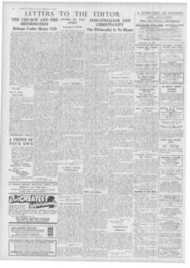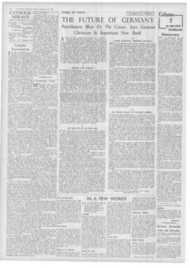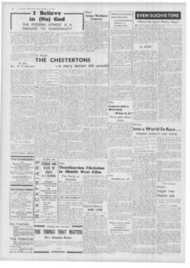Page 2, 26th September 1941
Page 2

Report an error
Noticed an error on this page?If you've noticed an error in this article please click here to report it.
Tags
Share
Related articles
To Make England Christian Again
Lessons Of The Dutch 'reformation'
" The Anglican Illusion"
Is This A Dream?
Propaganda Won The Day For The Reformers
THE CHURCH AND THE REFORMATION Bishops Under Henry VIII
Sta,—One must certainly accept the general thesis of Mgr. Barton Brown as to the gradual defection of this country from the Holy See and its disastrous consequences, but it is only fair to point out that things were rather better in the days of Henry VIII than his review suggests. It is true that of the 22 Ordinaries St. John Fisher, Cardinal, was the only martyr, but we know also that Athequa, Bishop of Llandaff and confessor to Queen Katherine, refused to take the oath of Supremacy. Also behind this body of 22 Ordinaries stood the Auxiliary Bishops who carried on the day-to-day working of the Catholic Church when the Ordinaries were engrossed in State affairs. We know that during the time of Warhatn there were about 35 of such " titular " Bishops and Cranmer consecrated four more before Henry took over the business by the Erastian Act of 1534. Most of the Ordinaries and a large number of the " titulars " did in fact die in Communion with the Holy Sec and one of the titulars, Bishop Macherell (Chalcedon) was hanged for participation in the Pilgrimage of Grace. All the Marian Catholic Bishops with one exception stood firm and were Confessors of the Faith. It k not a bad record—much better than the casual reader of our history in the 16th century imagines. I am srieaking here only of the Episcopal Body. Many of the Henrician Bishops lived to see the error of their ways —notably that grand old Englishman, Tunstall, Bishop of Durham, appointed in 1522, who 37 years later refused to accept the Elizabethan Settlement and died on Nov. 18, 1559. The Titular Bishops were not foreigners, they were just ordinary English ecclesiastics with common English names, and probably the salt of the earth.
CHARLES 0. Motu IMER.
.2 White Buildings. Lee on Solent.
Plea For Better Understanding
SIR—Will you be so good as to allow an Anglican, who is a regular reader of the CATItoLtc HERALD, to offer some comments on the article by Mgr. Barton Brown in the issue of September 19? Christians of all allegiances would probably agree with his estimate of the religious position in this country to-day. At the same time, one cannot help feeling that in some respects at least he has given a somewhat misleading impression of the Church of England. As we all know, the books which have been written on the Anglo-Roman controversy would till a good-sized library, bid perhaps I shall not be taking up too much of your space if I confine myself to some only of the statements made by Mgr. Barton Brown in his article. Whilst recognising the existence of a movement of Catholic revival in late Elizabethan and Stuart times, he writes of Oliver Cromwell as having " purged the Established Church of all popery." What Cromwell really did was to suppress the Church of England in the interests of a Presbyterian Establishment. There was no question of maintaining her in being in any shape or form—as witness the diary of John Evelyn and other contemporary records. It will be remembeled that John Cosin, for example, the future Bishop of Durham, spent some years as an exile in France ministering to a congregation of his fellow-exiles. The rigour of penal law was reserved for " Prelatists " and " Papists "—this period being the only one in English history when Roman Catholics and Anglicans found themselves in the same condemnation on account of religion. Catholic ideas revived at the Restoration. as Mgr. Barton Brown admits, but he goes on to say that all the Catholic-minded departed with the Non-Jurors, If this is so, how are we to account for the " thin red line " of Anglo-Catholics throughout the eighteenth century? Further, it must be remetnbered that many, perhaps most of the Non-Jurors returned. This process of reconciliation had begun as early as the reign of Anne. It is true that the accession of George I was the occasion of a fresh crop of secessions, but the movement of return did not thereby cease altogether. Many of the Catholicminded did not join the Non-Jurors at all. Mgr. Barton Brown is of course correct in saying that Catholicism became mixed up with Jacobitism, but how does he justify his statement that the Oxford Movement was too late, except in so far as it produced conversions to the Roman Church? He must surely admit that it changed the Church of England. If he doubts that let him ask the Protestant section of the Church of England, which is always bewailing what it considers to be the ever-increasing " Romanisation " of the Church.
The charge of " Congregationalism " may iv true of some Anglo-Catholic churches, hut I do not believe it to be so of the majority. Those Anglo-Catholics who appear to spend their time belittling everything Anglican, and producing a somewhat feeble copy of the Roman Church on no authority but their own, are a minor*, and in no sense representative.
Again, Mgr. Barton Brown seems to assume that the Church of England is some kind of semi-Calvinist body. I hope he will foigive a certain amount of plain speaking in this connection, which is not intended to be uncharitable. Some of us are very weary indeed of the endless repetition of the cliches of a cheap controversy. We are well aware, of course, that Anglicans as well as Roman Catholics have been, and still are guilty. It is unworthy of those who make use of it, and quite unhelpful, since it tends to keep open the breaches. That reconciliation with the Holy See which the Lambeth Conference has itself declared to be necessary. will never be brought about while it remains to embitter relations between the two Churches. Cannot our Roman brethren adopt the spirit of some of their forefathers, indeed of some of those of our own time? For example, we have on reefed the declaration of Bishop Doyle, of Kildare and Leighlin, in 182'5—"As a Christian Church possessing a Hierarchy and preaching the doctrines of the Gospel. I respect it (the Church of England), and esteem it more than any other Church in the universe separated from the See of Rome." Or again. in 1749, the Vicar-Apostolic of the Midland District wrote of the "doctrine of the Church of England which expresses the real and substantial presence of Christ's Body and Blood in the Sacrament as fully as any Catholic can do." These are only two instances of the expression of a spirit we in our day would hail with delight, were it to make its appearance more frequently. It is to be hoped that the Sword, of the Spirit will be able to exert an influence in favour of greater mutual understanding. We who hold to the historic Anglican tradition have no more use for compromise with the truth. or a so-called union through agreement upon ambiguities than has the Church of Rome, but surely no harm and much good will result if this unfortunate habit of inexact statement is given up once and for all by both parties to the discussion. In conclusion, I notice that Mgr. Barton Brown writes in a letter published elsewhere in the same issue of your paper—" Courtesy demands that we should apply to others the names they claim for themselves," and then uses the term, " Established Church," which is not, so far as 1 know, employed in any Anglican formulary. The title page of the Book of Common Prayer describes that book as " The Book of Common Prayer . . . of the Church, according to the use of the Church of Eqgland." This expression " Church of England" is also to be found in the tractare " Concerning the service of the Church," prefixed to the Book of Common Prayer, and in the declaration preceding the Articles of Religion. It is, of course, the official English rendering pf " Ecclesia Anglicana."
G. G. PINNOCK.
92, Petts Wood Rood, Pelts Wood, Orpington, Kent.
blog comments powered by Disqus









